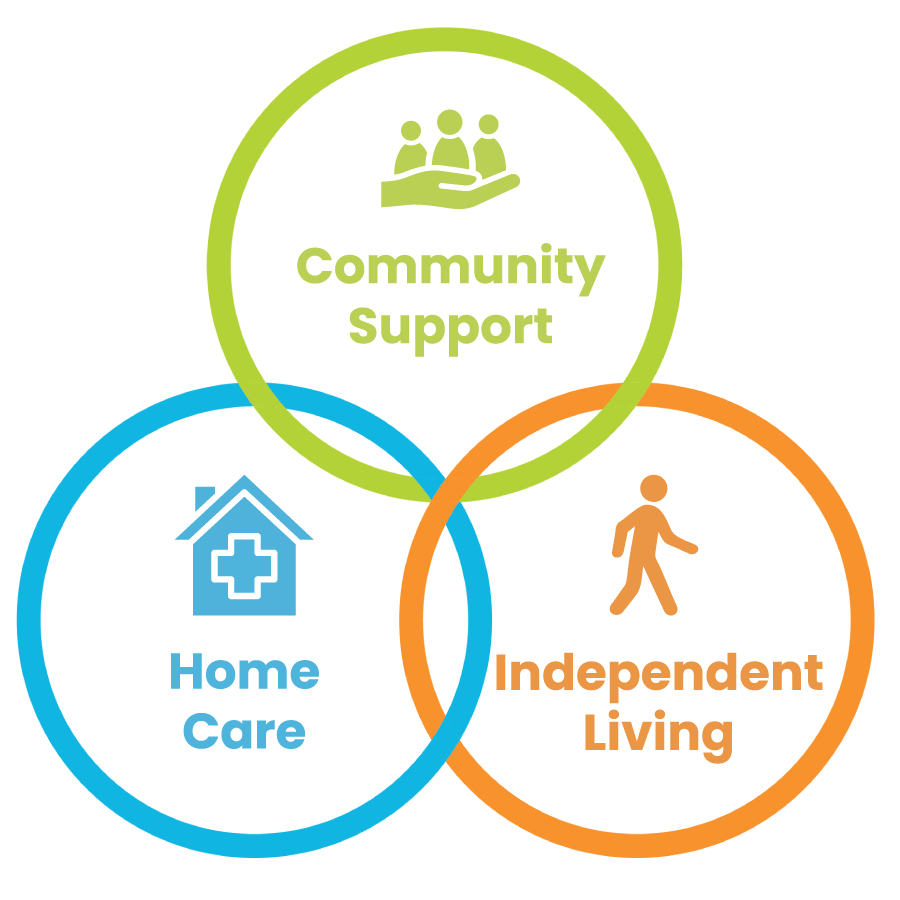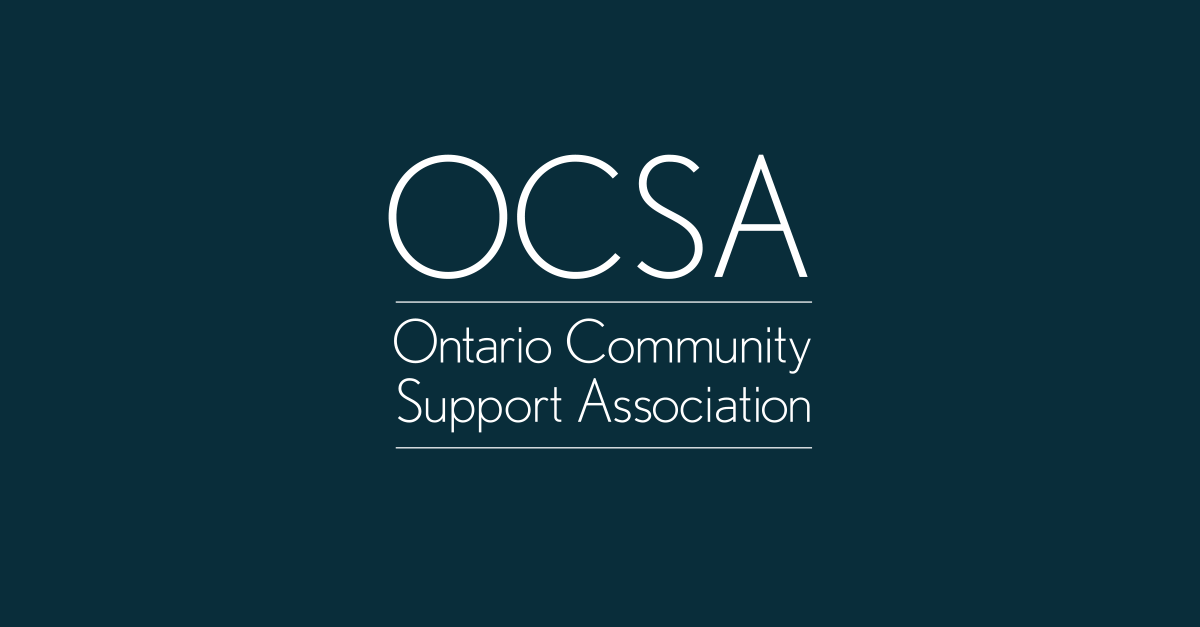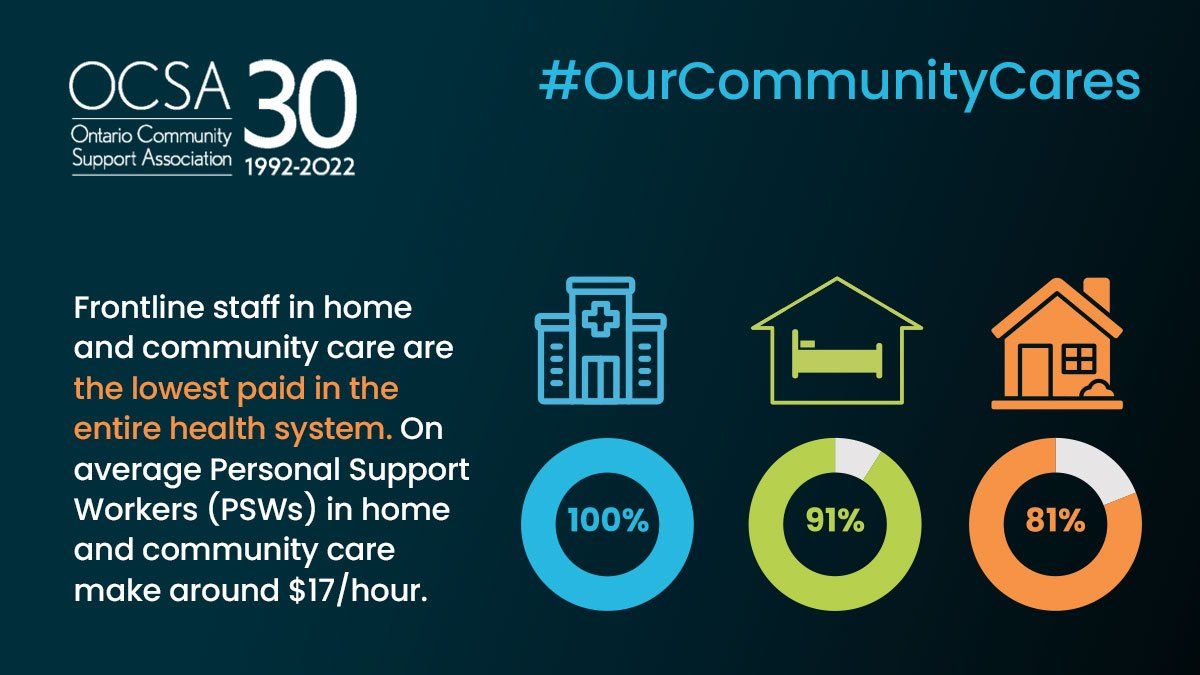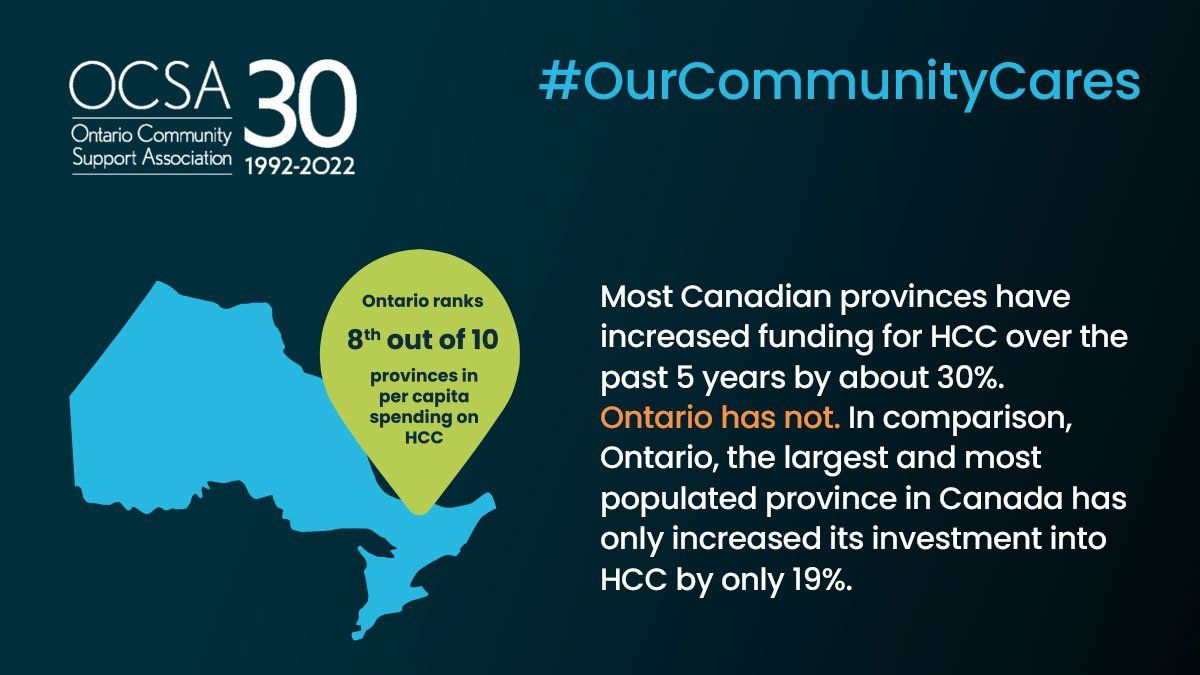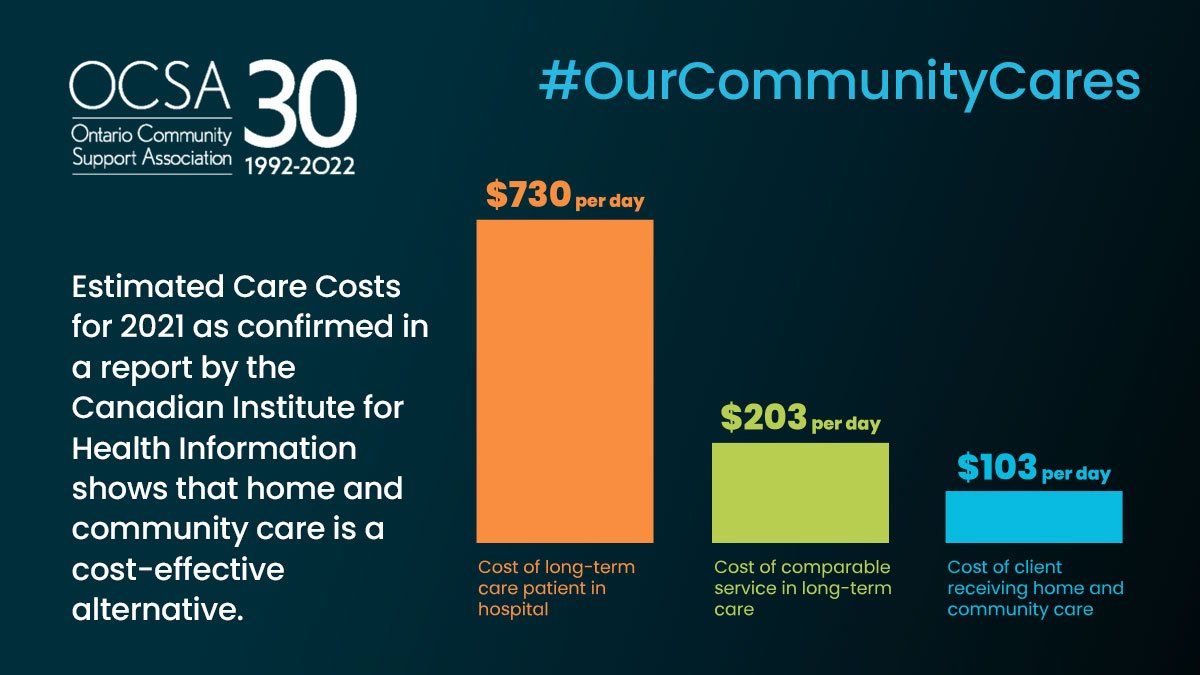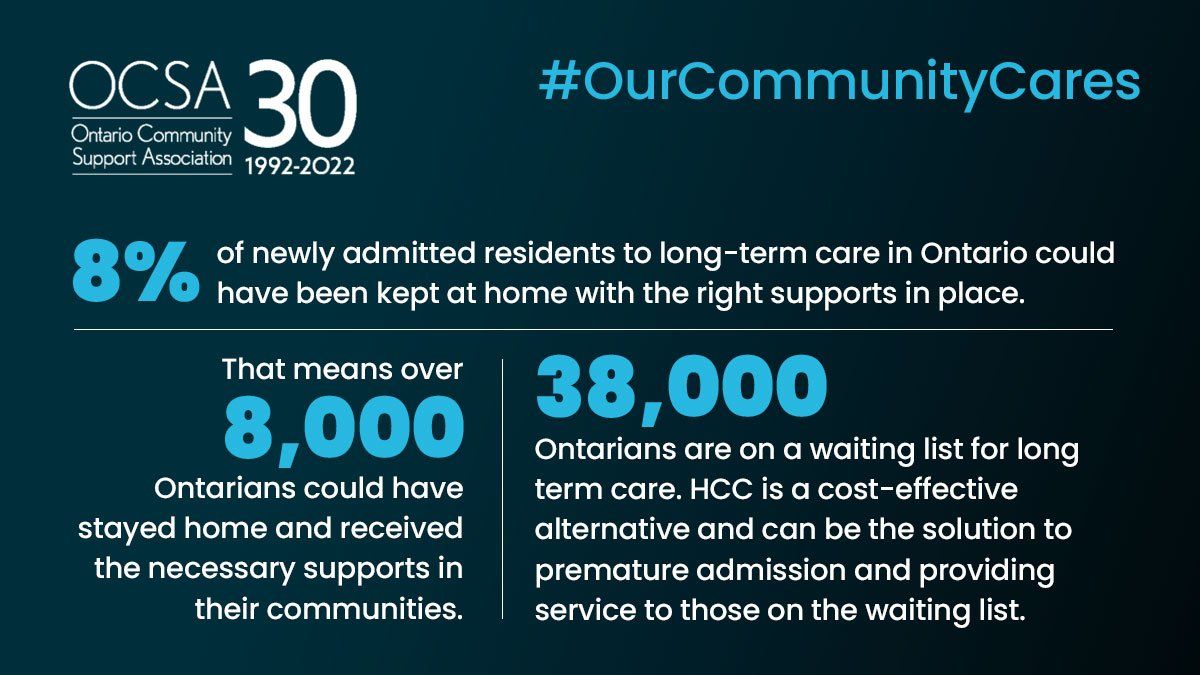#OurCommunityCares
Home and Community Care includes three large service areas
Nursing
Personal Support Services
Occupational Therapy
Meals & Housekeeping
Assisted Living, Day Services & Caregiver Supports
Rides & Transportation
Attendant Outreach
Supportive Housing
Acquired Brain Injury Services
All three are equally important to the well-being of our health care system. All three are unique and essential and require funding and support to provide crucial care for more than one million Ontarians.
Please spread the word and share this page !
Most Canadian provinces have increased funding for HCC over the past 5 years by about 30%. Ontario has not. In comparison, Ontario, the largest and most populated province in Canada has only increased its investment into HCC by only 19%.
The lives of patients and clients are at risk. A sustainable investment into HCC will:
- Support patients/clients with ongoing services, including new patients
- Alleviate overwhelmed hospitals and LTC homes
- Support caregivers who have been shouldering the burden the entire pandemic
A report by the Canadian Institute for Health Information confirms:
8%
of newly admitted residents to long-term care in Ontario could have been kept at home with the right supports in place.
That means over
8,000
Ontarians could have stayed home and received the necessary supports in their communities.
38,000
Ontarians are on a waiting list for long term care.
HCC is a cost-effective alternative and can be the solution to premature admission and providing service to those on the waiting list.
Did you know?
PSWs in the home and community care sector have the same training yet make on average 19% less than PSWs in the hospital sector and 9% less than PSWs in the long-term care sector.
Wage disparity occurs for a variety of reasons but the most significant is the majority of home and community care providers are non-profits and they are not funded adequately to provide care for Ontarians who need it most.

Frontline staff in home and community care are the lowest paid in the entire health system. On average Personal Support Workers (PSWs) in home and community care make around $17/hour.
Stories
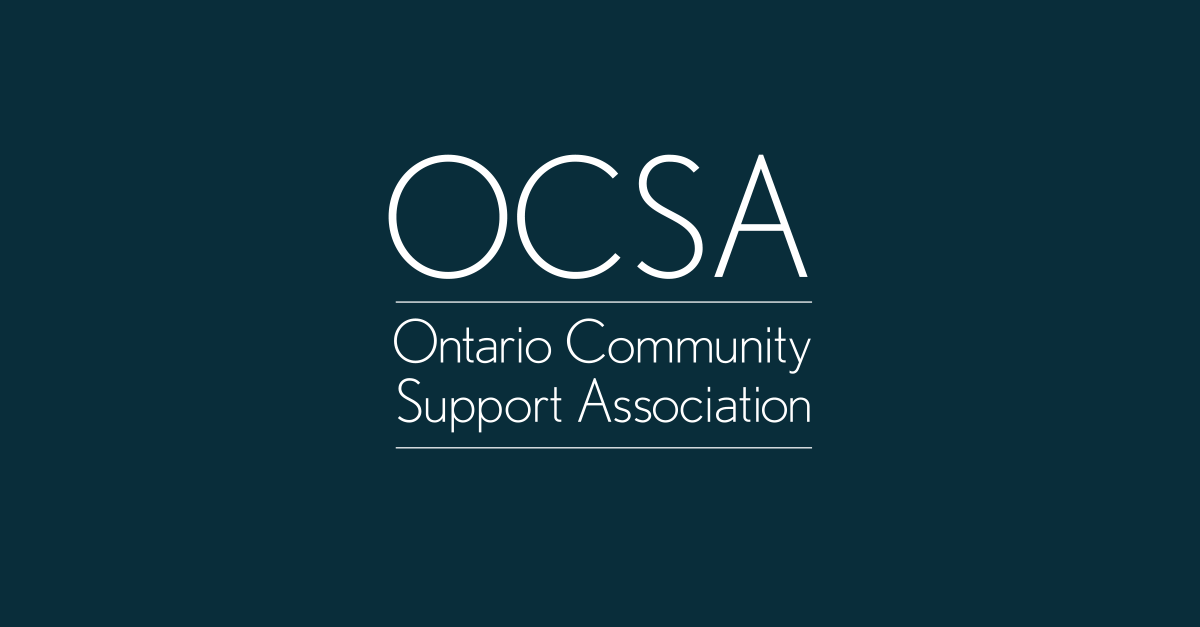
19 May, 2022
Toronto, Ontario – Personal Support Workers (PSWs) have a critical role in our healthcare system and assist in the provision of care to thousands of Ontarians. This is the message from the Ontario Community Support Association (OCSA) this PSW Day, May 19th. “PSWs have remained on the frontline throughout the pandemic, supporting vulnerable seniors and their families,” says OCSA CEO, Deborah Simon, “As we mark another PSW Day, we recognize the work of PSWs across the province and say thank you.” Against the backdrop of a severe PSW shortage, OCSA is also highlighting the need for wage parity for PSWs across healthcare. “Regardless of the setting, PSWs possess the same qualifications and are expected to perform similar tasks,” says Simon, “Yet PSWs in home and community care are paid less than their counterparts in long-term care and hospitals. This compounds the challenge of PSW recruitment and retention and is having a devastating impact on families that depend on PSWs coming to their homes.” About OCSA Ontario Community Support Association (OCSA) represents close to 230 not-for-profit organizations that provide home care and community support services that help seniors and people with disabilities live independently in their own homes and communities for as long as possible. These compassionate and cost-effective services improve quality of life and prevent unnecessary hospitalizations, emergency room visits and premature institutionalization. They are the key to a sustainable health care system for Ontario. For more information, visit www.ocsa.on.ca and https://twitter.com/OCSAtweets . For comments/queries please contact: Karla Sealy Communications Manager Ontario Community Support Association 416-256-3010 ext. 242 Karla.sealy@ocsa.on.ca

10 May, 2022
Toronto, Ontario – This National Nursing Week, May 9-15, the Ontario Community Support Association joins in recognizing the contributions of the registered nurses (RNs), registered practical nurses (RPNs), and nurse practitioners (NPs) who provide support and care to Ontarians daily. “Over the course of the pandemic we have witnessed the extraordinary efforts of nurses, whether it be at home and in the community, in long-term care or in hospital,” says OCSA CEO, Deborah Simon, “This Nursing Week, we say thank you to all nurses for your commitment.” The OCSA is also renewing their call for wage parity for nurses and other frontline positions in the home and community care sector as an important way to ensure staff retention. According to a recent OCSA membership survey from December 2020 and December 2021, there has been a 421% increase in vacant RN positions and 331% increase in vacant PSW positions in the home and community care sector. “Ontario needs a comprehensive health human resource strategy that includes funding for home and community care as part of the overall continuum of care in our province,” says Simon, “As we celebrate the tremendous efforts of nurses this week, we urge the province to build capacity across all sectors so that Ontarians have access to a high performing health care system and integrated care delivery.” About OCSA Ontario Community Support Association (OCSA) represents close to 230 not-for-profit organizations that provide home care and community support services that help seniors and people with disabilities live independently in their own homes and communities for as long as possible. These compassionate and cost-effective services improve quality of life and prevent unnecessary hospitalizations, emergency room visits and premature institutionalization. They are the key to a sustainable health care system for Ontario. For more information, visit www.ocsa.on.ca and https://twitter.com/OCSAtweets . For comments/queries please contact: Karla Sealy Communications Manager Ontario Community Support Association 416-256-3010 ext. 242 Karla.sealy@ocsa.on.ca
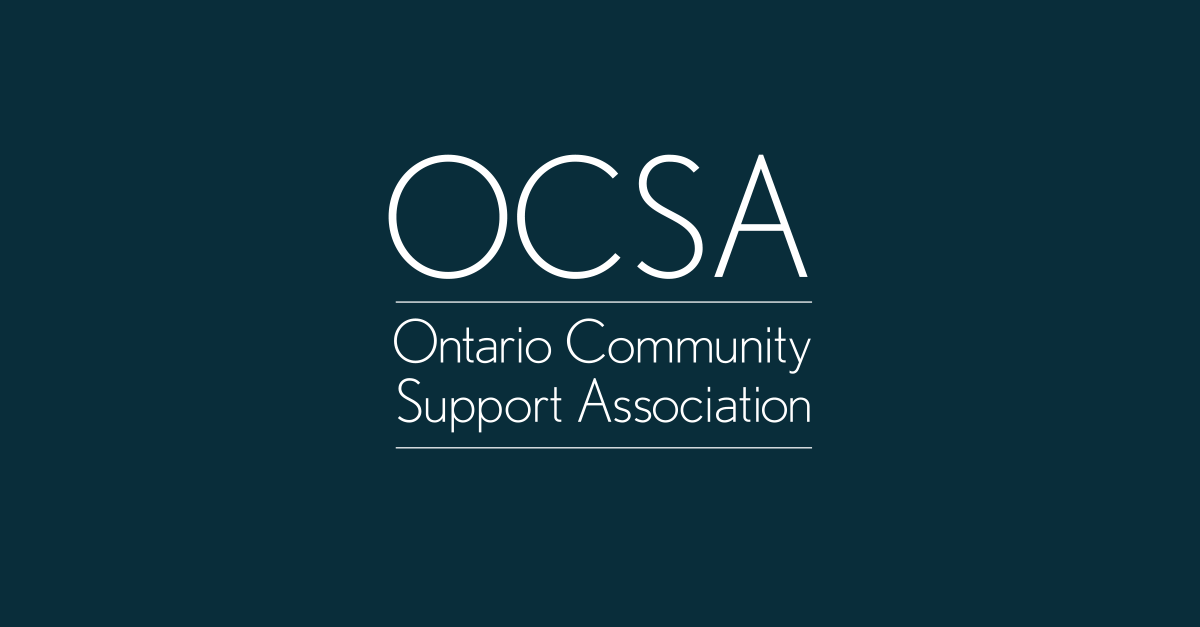
28 Apr, 2022
Toronto, Ontario - April 28, 2022 - The provincial government’s plan to significantly increase funding for home care will help to ensure Ontario’s most vulnerable are able to age and live well in their homes and communities. This much needed funding will play a crucial role in helping the sector continue to deliver services and reduce the growing pressure on hospital capacity. We commend the government’s continued investment into the Ontario Community Support Program. Over the past two years, this successful program has completed more than 1.6 million meal and medicine deliveries to over 70,000 low-income seniors and people with disabilities in communities across the province. Community support service agencies continue to play an essential role in the system by supporting vulnerable Ontarians and maintaining their independence at home. A strong community care sector is the bedrock to a sustainable health system. The base increase and service expansion of community support services announced in today’s budget represents a vital and much-needed injection of funding to maintain the viability of these services in the short-term. However, we need a plan for the long-term sustainability of these critical services which support one million Ontarians to age at home and in their community. “Budget 2022 will help the more than one million and growing Ontarians who rely on home and community care to remain living well at home.” said Geoffrey Quirt, Board Chair of OCSA, “Our members have stepped up throughout the pandemic to serve their communities with compassion and commitment and these investments will help them continue to do so.” About OCSA Ontario Community Support Association (OCSA) represents close to 230 not-for-profit organizations that provide home care and community support services that help seniors and people with disabilities live independently in their own homes and communities for as long as possible. These compassionate and cost-effective services improve quality of life and prevent unnecessary hospitalizations, emergency room visits and premature institutionalization. They are the key to a sustainable health care system for Ontario. For more information, visit www.ocsa.on.ca and https://twitter.com/OCSAtweets . Interviews are available with OCSA Board Chair Geoff Quirt. For more information please contact: Karla Sealy Communications Manager Ontario Community Support Association 416-256-3010 ext. 242 Karla.sealy@ocsa.on.ca

04 Mar, 2022
Michelle, an energetic and dynamic individual receives assistance that enables her to be an active member of her community. Michelle lives in a supportive housing facility where she receives daily assistance with her personal care as well as trach care. Michelle suffered a spinal cord injury at birth and as a result lived in a hospital setting for 14 years. The attendant support that Michelle receives allows her to live outside of a hospital setting and in her own apartment. -Michelle

04 Mar, 2022
Aaliyah is a 25 year old physically disabled woman of colour. She has lived in a Community Support Service Congregate Care program for 6 years. When Aaliyah first moved in, she was a quiet and timid teenager who was afraid to speak up for herself. She was guarded and skeptical when it came to trusting and accepting the help of her new team. Over time, Aaliyah’s team worked with her to earn her trust and prove that she can rely on them for support. Now, Aaliyah is a strong self-advocate who controls the direction of her own life. She has developed life skills and independence, effectively directing the services she receives and collaborating with her team. Aaliyah has also made strong connections within her community and earned the respect of others for her kindness and compassion. With the support she has received; Aaliyah has learned the power of her own voice and gained the confidence to use it! -Aaliyah

04 Mar, 2022
Greg, a vibrant, active person with disabilities who receives support services that have enabled him to live independently in supportive housing for 18 years and volunteer in the community. The attendant outreach services Greg receives enable him to volunteer four days a week at Holland Bloorview Kids Rehabilitation Hospital where he is proud to give back to the hospital he called home from age nine - 18 before moving into his own apartment in the community. Greg has also received support from a specialized rehabilitation centre which helped set up his computer and voice-activated software, as well as assistance with his wheelchair, bed, lift and phone from an occupational therapist with the Home Care program. - Greg

04 Mar, 2022
Arun, who has renal system complications and major health concerns that have seen him regularly in and out of hospital. During one of his hospital visits, staff referred him to a Community Support Service Transitional Care program. Arun receives dialysis transportation rides three times a week, a Personal Support Worker (PSW) to help him three times a week with personal care, assistance with meal preparation, and medication reminders. The PSW assistance has reduced the pressure and stress on his spouse as his sole caregiver. She no longer feels alone and is very relieved that she and Arun do not have to rely on the hospital system as much as they did in the past. - Arun
How you can help:
Send a letter to your MPP
Share one of our prepared social posts on your social media channels and help raise awareness
Share on your own social media with the hashtag #ourcommunitycares and link to osca.on.ca about your story or experience
Follow us on social media to learn more and share important news and information about Home and Community Care with your network.
Share a Social Post in Support
CONTACT US
180 Dundas St. W., Suite 1400-B,Toronto, ON M5G 1Z8
416-256-3010 | 1-800-267-OCSA
info@ocsa.on.ca
Charitable Registration #:
13426 9505 RR0001
HOURS
Monday - Friday 8:30am-4:30pm
